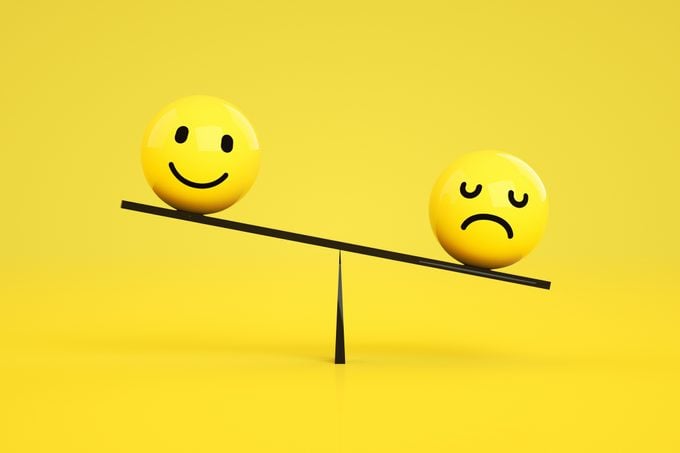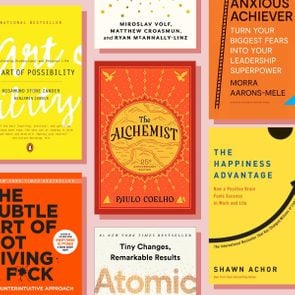Can Money Buy Happiness? Here’s What to Know If You’re on a Tight Budget
Updated: Mar. 20, 2024

The old adage says money can't buy happiness, but new research is challenging that idea. Here, experts explain how money affects happiness and how to use your money to be happier—even on a tight budget.
Our editors and experts handpick every product we feature. We may earn a commission from your purchases.Learn more.
Can money buy happiness? If you said no, you’re not alone. If we’ve heard it once, we’ve heard it a million times: Money can’t buy happiness.
“Fake news!” says Elizabeth Dunn, PhD, a psychology professor at the University of British Columbia and author of Happy Money: The Science of Happier Spending. “People treat this like a fact, but the science shows it just isn’t true.”
Of course, learning how to be happy isn’t quite that simple, and the devil is in the details. Our income and spending habits affect our happiness—both positively and negatively—so it’s important to learn how to earn, save and spend money in ways that bring real happiness while avoiding common financial pitfalls that bring misery, she says.
Happy on any budget
“People often ask the wrong question about money and happiness,” says Dunn. “Instead of asking, ‘How can I get more money to become happier?’ you should be asking yourself, ‘What can I do with the money I’ve got to become happier?'”
The answer might include big things, like going to college or finding your purpose in life, but it can also be as small as … a Kleenex?
“It took me years to use real tissues,” says Gretchen Rubin, happiness expert and author of The Happiness Project and Better Than Before. “I’m big on only buying what you need, so I always just used toilet paper—it’s cheaper, it’s convenient and why would you buy a separate thing just for blowing your nose? One day, I finally gave in to family pressure and spent a little extra money to buy a box of tissues. And they really were better. Tissues are so soft!” And when you’re sick, sometimes having a soft place to blow your nose is a tiny bright spot of happiness.
The point: If you’re trying to be happy and have a positive attitude, you can find greater happiness on any budget—even a tight one, says Rubin. We asked our experts to share their top tips for using your money to increase your happiness without breaking the bank.
Get Reader’s Digest’s Read Up newsletter for more happiness, humor, cleaning, travel, tech and fun facts all week long.
So, can money buy happiness?
“We can basically say now that it’s an established scientific fact that it can,” says Dunn.
Indeed, this was the finding of Dunn’s 2022 study published in the journal PNAS. She and her research team gave $10,000 each to 200 people around the world, totaling $2 million. (Sign us up for that study!) The team then studied what participants did with the money and how it affected their levels of happiness.
They found that the cash “substantially increased” every measure of happiness, no matter the recipient’s income level or where they lived. But the increase in happiness was proportional to their socioeconomic status. Those who lived in poorer countries experienced happiness gains three times larger than those in higher-income countries—likely because the money made a bigger difference in their lives. Still, while the money didn’t give wealthier folks as big a happiness high, in no case, adds Dunn, did the extra cash make anyone sad.
The happiness plateau
If an income boost can make us happier, it begs the question: Does money buy happiness no matter how rich we are? That’s a little less clear. There’s conflicting evidence about whether happiness levels off after a certain income level.
A famous 2010 study conducted by two Nobel laureates (and also published in PNAS) found that people with low incomes reported both a lower evaluation of their overall life and lower emotional well-being. Earning more money increased their happiness … until they hit an annual income of about $90,000 in today’s money. After that, however, greater income increased life satisfaction but didn’t necessarily boost happiness.
Yet a 2021 PNAS study found that there was no “happiness plateau.” Harvard researchers asked more than a million people to track their happiness levels via an app and saw happiness and life satisfaction continue to increase with greater income, even for the richest of the bunch.
The happiest spenders
A 2015 study from the University of Cambridge offers some nuance. Researchers examined more than 75,000 bank transactions and then surveyed the spenders about how happy they were. They found that more money does equal more happiness—as long as you’re spending it on things that feel consistent with your personality and values.
So, can money buy happiness? All this research points to the fact that happiness isn’t really about how much money you have but how you spend it, say our experts.
Why money might make you happier
The biggest increase in happiness comes when lower-income people are able to spend money to fill basic life needs, like food, shelter, safety, transportation and medical care.
“At its most basic level, money can increase happiness because it provides security, stability and a buffer against negative life events,” says Dunn.
But Dunn’s research found a boost in happiness even after basic needs are met.
“Money can buy you the luxury of not worrying about money,” says Rubin. “In addition to meeting basic needs, it can buy choice, freedom, opportunities and education—all things that can make you happier.”
Not sure what to spend your money on? Here’s how to set goals and make a goal-setting vision board to get you on the right fiscal track.
The biggest happiness return for your buck
Let’s say your basic needs are met. What should you spend your money on if you want the biggest happiness boost? Other people.
“The No. 1 thing correlated with a person’s happiness is the strength and quality of their relationships,” says Rubin. “So spending your money on things for other people or on activities that bring you closer to loved ones will make you the happiest.”
Dunn agrees. “This is probably the best-supported principle in happiness research. People who spend their money helping others feel the happiest, by a lot,” she says. Ultimately, this is what community is all about.
When money can’t buy happiness

There isn’t a direct relationship between more money and greater happiness. In fact, there are some situations in which money can make you downright miserable.
When you’re overworked
How you get your money plays a major role in whether it leads to happiness. The participants in Dunn’s study were simply given an extra 10 grand, but most of us have to work hard to make ends meet, much less come up with extra money. So is it worth it to work harder or longer to get more money? Even if you see your loved ones less often?
This struggle for work-life balance is at the core of a lot of people’s unhappiness with money, leaving them feeling unseen and taken for granted, says Rubin. “It’s about values and priorities and which do we value more: our money or our time?” she says.
If you’re unable to set boundaries between your work and your personal life, you may find that a high income doesn’t deposit anything into your happiness bank.
When you’re constantly stressed about money
Another factor, says Dunn, is the real phenomenon of money anxiety, which can create a vicious cycle of unhappiness. And this can affect people of any income level, as it’s the perception of needing more money that causes anxiety.
“People can become very fixated and even neurotic about money, and the more they focus on getting more money for the sake of more money, the more unhappy they become,” she explains.
One common source of this fixation is social media. It’s ripe for comparison between your life and others’ high-spending lifestyles. If you find yourself feeling bad after seeing what other people have or do online, it’s time to stop wasting time and do a digital detox.
When spending puts you into debt
Then there’s the fact that so many of us spend our money on things that put us in debt while filling our houses with barely used junk.
“If you listen to pop culture, everyone loves shopping, and the point of having money is just to buy more things, but things bring clutter more often than happiness,” says Rubin. Not to mention that debt can be a huge source of anxiety, fear, grief and sadness.
In fact, the happiest you’ll be with a purchase is likely the moment right before you buy it, says Dunn. “It’s that feeling of anticipation and excitement for the new thing,” she says. “Once you own it, it’s no longer as cool, and there will be something bigger and better—that’s the foundation of consumer culture.”
How to be happy on a tight budget
The amount of money you have isn’t always in your control. But there are things within your control that affect your happiness, and you can definitely be happy even if you’re broke. In fact, the creativity and planning it takes to have fun on a budget may give you even more satisfaction and happiness, says Rubin.
Follow these tips for being happier on a budget.
Buy experiences, not things
“Trips, concerts, meals out and other experiences make you feel happy because they give you a unique memory, connections with others and ultimately become a part of your sense of self,” says Dunn. She adds that the experience doesn’t have to be a trip to Tahiti to be memorable and special. Sometimes the best memories are simply playing soccer in the park as a family or going on a hike in a National Park.
Turn habits into treats
During the COVID-19 quarantine, Dunn became a daily user of DoorDash—a habit that stuck with her long after she could go out for food again. That is, until she realized how much that habit was costing her and how little happiness it brought her.
“The reason I liked DoorDash in the first place was because getting food delivered felt like a treat, a little luxury. But when luxuries become habits, they no longer give us that same boost,” she says.
Her advice? Find a habit that’s costing you money—like a daily cup of coffee at a coffee shop or a candy bar at the grocery store—and turn it back into a treat. That’s right: Break the habit and commit to doing that task only on special occasions. “You’ll save money, and it will bring you more happiness when you do indulge,” she says.
Buy yourself time
“Time stress is a real burden on people, and anything you can [do to] reduce that will make you happier,” says Dunn. People who spend money on time-saving technology, services and even gadgets report feeling happier for longer. This is because outsourcing tedious tasks, like house cleaning or doing taxes, frees you up to spend time with loved ones or practice self-care, says Rubin.
The typical suggestion to save time and feel happier at home is to hire a housekeeper, but if that’s out of your budget, consider what small tasks take up a lot of your mental energy and find a way to outsource that. For instance, if you hate grocery shopping, pay the extra $10 to have your groceries delivered. If you lose time every morning searching for your keys, buy an electronic tag for your keys that syncs to your phone. If someone asked you to make a flyer for a school function, consider paying $5 on Task Rabbit to have someone else do it.
Spend money according to your values, not your wants
Take the time to think about your core values, or what is most important to you. Then make a list of priorities that support those values. “That list defines where you should save and what you should spend your money on,” says Rubin. That list will also assist you in defining your non-negotiables, helping you avoid compromising your time and money on things that aren’t worth it
You may think you already do this, but the truth is that many of us buy on impulse, and companies are really good at capitalizing on that. Once you write down your core values (and keep a copy handy or take a picture to save on your phone), you’ll be able to make clearer spending decisions. And spending in line with your values exponentially increases your feelings of life satisfaction and well-being.
Pay now, consume later
Read that again—slower. This is the exact opposite of how most of us have been taught to think about spending money. “We live in a buy now, pay later world, and the really sad part about that is that it’s a surefire way to reduce your enjoyment of what you bought, as the ‘pain’ of spending the money is still in the future, while the ‘joy’ of the purchase is in the past,” says Dunn.
Instead, consider buying something and paying it off in full before you get it. This separates the pain of spending from the joy of receiving the item or experiencing the event. And it happens in an order that assures you true moments of joy. For example, if you buy a vacation and pay it off a month before you go, you’ll be able to fully enjoy it without having to worry about the cost because it was already budgeted and paid for.
Invest in others
Buying someone a gift, donating money to a cause you value, giving change to a homeless person, volunteering your time (and time is money, make no mistake)—all these things will make you feel so much happier than spending the money on something for yourself, say our experts.
We asked our experts to share some budget-friendly purchases that pay off big-time in the happiness department. Here’s what they came up with:
- Buy a package of thank-you cards, and write one thank-you note each day. Then give or send it to someone—it’s a great way to practice gratitude.
- Buy something under $10 for a hobby you enjoy doing.
- Buy ingredients to bake cookies and take them to your neighbors.
- Visit a local museum or arboretum with a friend on a free or reduced-fee day.
- Use your money to try new things, like taking your partner on a walking tour of your city.
- Hire a babysitter for one hour and go somewhere quiet and read or meditate.
- Have lunch at a local food truck and chat with the owner. (Psst! Here’s how to talk with strangers.)
- Go to a local sporting or music event and enthusiastically cheer them on, even if you’re unfamiliar with the team or band.
- Pay for the order of the person behind you in the line at the coffee shop or drive-thru.
- Hire an Uber to drive you to the airport so you don’t have to deal with parking or traffic.
In the end, if you’re asking “Can money buy happiness?” you’re asking the wrong question. As the experts say, money can make you happier. But ask yourself this: How can I use the money I have—whether a little or a lot—to increase my happiness? You don’t need a major financial windfall to be happy. You simply have to shift your spending strategy. Make sure your basic needs are met, then invest in others and experiences. It’s the only strategy for buying your way to a happier life.
Sources:
- Elizabeth Dunn, PhD, psychology professor at the University of British Columbia and author of Happy Money: The Science of Happier Spending
- Gretchen Rubin, happiness expert and author of The Happiness Project and Better Than Before
- PNAS: “Wealth redistribution promotes happiness”
- PNAS: “High income improves evaluation of life but not emotional well-being”
- PNAS: “Experienced well-being rises with income, even above $75,000 per year”
- Psychological Science: “Money Buys Happiness When Spending Fits Our Personality”


















